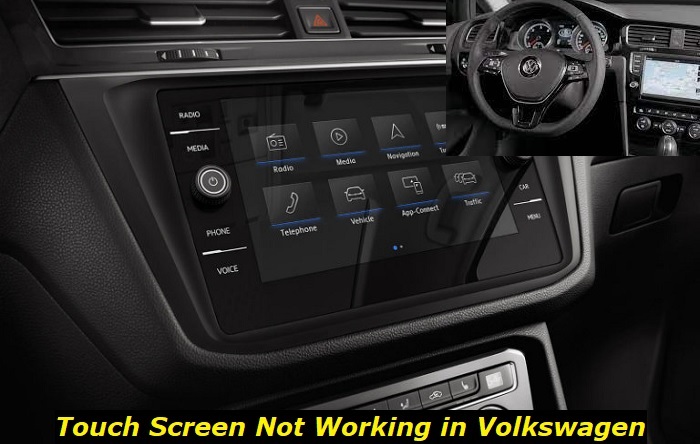These days, touch screens play a huge role in our lives. From smartphones and computers to car infotainment systems, they are pretty much everywhere. The truth is, they are great and they help a lot when it comes to getting rid of useless buttons in car interiors.
Touch screen problems highlights
- Reasons:touch screen death, glitch, freezing of the software
- Quick fix:reset the system
- Price forrepair:$0 - $1,000
- Time forrepair:0.2 - 2.5 hours
- Howcommon:very common
- DIYrepair:sometimes possible

Why do touch screens fail?
As with all electronics, touch screens can sometimes be a bit temperamental, so it is normal to a certain extent for them to act up from time to time. However, if the touch screen starts behaving strangely regularly, it would be a good idea to start investigating the issue. Here are a few reasons that could cause them to stop working:
- Not enough processing power - Doing many things at the same time, such as listening to music via Bluetooth or a CD, using satellite navigation, and also messing with the settings might result in unresponsiveness. This will be more common in older units that have less processing power than newer ones, but it is not impossible for newer ones to be a little bit overwhelmed sometimes, so try to avoid asking too much from your infotainment system.
- Software bugs - No matter how much thought the developers have invested in certain software, there will always be something they haven't thought about that could cause problems. Software bugs are present in pretty much any computer or mobile application and they usually are more present with the first versions of certain programs, but it is not uncommon for them to appear after updates either.
- Screen not calibrated properly - Many systems have the option to calibrate the screen and if yours has it, you should try doing this operation if the touch screen has been acting up. What this does, is to make sure that the system recognizes properly all the touch inputs you're giving to it, so that it doesn't do something you haven't asked it to do.
- Overheating - If the unit itself has been running for a longer time and you have been listening to music at full volume or if you have been playing with it quite a lot, the touch screen and the unit itself might stop responding simply because of the high temperatures they have reached. This happens to protect the system from burning certain components.
- Blown fuse - There are situations in which the fuse for the infotainment system will blow, to prevent shorting out certain components. This is an issue that might need a little bit more investigation since the culprit might be a wire or a plug somewhere that has too much resistance to it.
- Bad connections - Maybe the last time you have taken the head unit out of your car you have forgotten to plug something back in or certain connectors are not properly seated and that will almost certainly mean certain functions, including the touch screen, will stop working.
- Physical damage - While everyone knows that VW products are pretty much always very high-quality items, they are not bulletproof. Physical damage to touch screens will do quite a lot of harm to them and could even make them stop working completely.
- Faulty touch screen - In a worst-case scenario, the touch screen itself has failed due to age and use, which is normal after a certain period. However, there are situations in which they fail way earlier than expected, in which case it would be a good idea to read on the internet and see whether other users have experienced this fault. If it turns out to be something common, maybe there is a recall or a free fix from the dealer available, so make sure to do your homework before you start spending any money.
How to avoid problems?
Avoiding problems is almost entirely related to the way the user operates the system. If used properly, touch screens have a quite long lifespan and they shouldn't act up anytime soon. Here are a few things you could do to help the touchscreen and infotainment system in your VW last longer:
- Keep the screen clean - Cleaning the screen from time to time using special touch screen solutions and microfiber cloths not only keeps it looking fresh for a long period but also helps in avoiding dirt and debris from sticking to it and later causing it to start acting up.
- Perform regular updates - As with any electronic device that uses software, there will probably be several updates that should be performed as soon as they appear. They usually fix previous issues and help the unit work smoother or, in some cases, offer new functions. Bear in mind that it is not uncommon for certain issues to appear after updating the unit, so if you don't have any newer version to update to, it should be ok to downgrade to the last working version.
- Clean the cooling system - To keep them working properly, infotainment systems have cooling systems as well. They are visible only after removal from the dashboard, so to clean them, you have a bit of work to do, but in most cases, it shouldn't be too complicated. With time, dust and dirt accumulate in the cooling heatsinks and on the fan blades, thus reducing their efficiency. Gently blowing them with compressed air will usually do the trick just fine.
- Avoid damaging the screen - Whenever you are tossing things around the interior of your car or you are operating the touch screen while having another potentially sharp or hard object in your hand, you are always at risk of damaging the touch screen. Make sure to avoid doing any of the said things close to your infotainment system and also remember that touch screens do not require a lot of pressure to operate, so be as gentle as possible if you want them to last (and also avoid nasty fingerprints).
- Don't mess with wires and connectors if not 100% necessary - Wiring is best to be left alone unless there's an actual problem that requires you to mess with them. Also, if you don't know what you're doing, it is definitely not a good idea to try and repair something yourself, since you might do more harm than good.
How to fix the issues?
Fixing issues depends a lot on the actual cause of the problem. Sometimes, they can be fixed with just a hard reset of the head unit (or removing the negative terminal of the battery for a few minutes).
The procedure for resetting the unit manually should be available on the internet for each model, so make sure to use the one specific to yours. Cleaning the screen might also help it work as it should, so this should be a simple fix as well. When it comes to software updates, it is important to do everything properly, since a single wrong step might result in bricking the unit, and to fix that, you might have to perform a clean install of the operating system.
When it comes to anything software, there are many specialists out there that know what they are doing, so you should have no problem finding someone to do this for you. When it comes to hardware, such as broken connectors or faulty touch screens, it would be best to ask for specialist help, since you don't want to do even more damage.
However, if you feel confident enough, there are many guides on the internet, specific to each infotainment system, that show you step by step how to replace certain components and if you have the right tools and you enjoy a bit of DIY, just take your time and go ahead.
Remember to calculate fixing costs, since sometimes it might be a better solution to replace the head unit altogether.
Final thoughts
Touch screens in VW cars are no different from other manufacturers' touch screens, so pretty much everything that applies to VW will apply to other cars as well. Always take good care of your touch screens, since they are fantastic when they work properly, but can become very annoying if they suddenly stop doing so, and also, they can end up being very expensive to replace.
About the authors
The CarAraC research team is composed of seasoned auto mechanics and automotive industry professionals, including individuals with advanced degrees and certifications in their field. Our team members boast prestigious credentials, reflecting their extensive knowledge and skills. These qualifications include: IMI: Institute of the Motor Industry, ASE-Certified Master Automobile Technicians; Coventry University, Graduate of MA in Automotive Journalism; Politecnico di Torino, Italy, MS Automotive Engineering; Ss. Cyril and Methodius University in Skopje, Mechanical University in Skopje; TOC Automotive College; DHA Suffa University, Department of Mechanical Engineering






Add comment